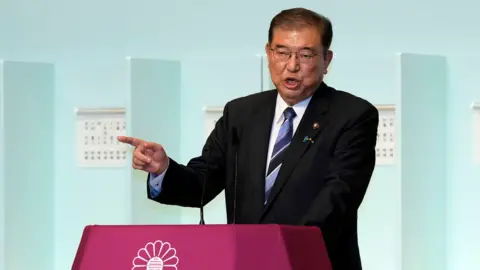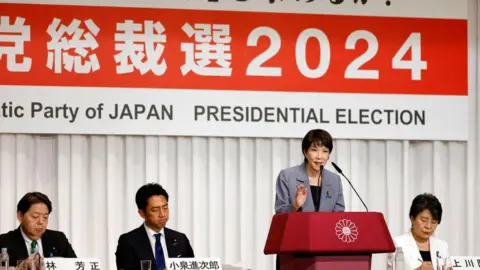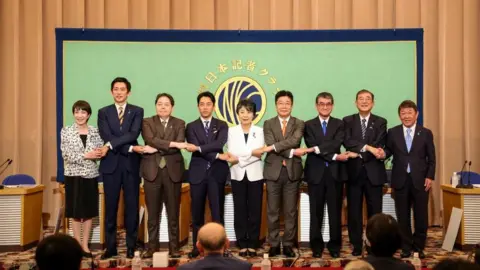 EPA
EPAJapan’s ruling party has elected Shigeru Ishiba as its new leader, positioning a political veteran as Japan’s next prime minister.
Nine candidates are vying for the leadership of the conservative Liberal Democratic Party (LDP), which has ruled Japan for much of the post-war period, after Prime Minister Fumio Kishida announced last month that he would not seek re-election.
Whoever is appointed as the new leader of the Liberal Democratic Party (LDP) will become prime minister because the LDP has a parliamentary majority.
The changing of the guard comes at a turbulent time for the party, which has been rocked by scandals and infighting that have dissolved its once-ruling factions.
Ishiba, 67, is leading most opinion polls in what he says is his fifth and, he said, final bid to lead the embattled LDP.
The winner was decided by an internal party vote rather than a popular vote. The race started with nine candidates before going to a contest between Ishiba and Sane Takaichi, who is running for Japan’s first female president.
Ishiba is in favor of allowing female emperors – a hugely controversial issue opposed by many LDP members and successive governments. His blunt honesty and public criticism of Kishida — a rarity in Japanese politics for a prime minister — rankled fellow party members while resonating with the public.
Takaichi, on the other hand, was one of only two women running for LDP leadership, but was also one of the most conservative of the candidates.
A close ally of the late former Prime Minister Shinzo Abe, Tagaichi’s positions on women’s issues are in line with the LDP’s policy that women should serve in traditional roles as good mothers and wives. She opposes legislation allowing women to retain their maiden names and legislation allowing female emperors.
 Good pictures
Good picturesA constant among frontrunners, however, is a pledge to overhaul the beleaguered LDP in the face of public anger and falling approval ratings.
“In the upcoming presidential election, it is important to show the people that the Liberal Democratic Party will change,” Kishida told a press conference last month.
The LDP leadership race is not just a race for the top post, but an attempt to regain public confidence that has bled the party in the past few months amid stagnant economy, families and persistent political scandals.
Chief among these scandals are revelations about how much influence Japan’s controversial Unification Church wields within the LDP, as well as suspicions that party factions underreported political funding over the years.
The fallout from political finance corruption led to the dissolution of five of the six factions in the LDP – factions that had long been the backbone of the party, and whose support was key to the LDP’s victory in the leadership election.
 Reuters
ReutersStill uppermost in the minds of the Japanese people, however, are the country’s deep economic woes.
In the wake of the Covid pandemic, average Japanese households are feeling the pinch as they struggle with a weak yen, a stagnant economy and food prices that are rising the fastest in nearly half a century.
Meanwhile, data from the Organization for Economic Co-operation and Development (OECD) show that wages in Japan have barely changed in 30 years. That slide, combined with 30 years of high inflation, is tightening the screws on Japanese households and prompting calls for government aid.
It also damages the LDP’s historically favorable standing among voters.
“People are tired of the LDP,” Miko Nakabayashi, a former opposition MP and professor of political science at Tokyo’s Waseda University, told the BBC. “They’re frustrated with the inflation they’re facing right now and the so-called ‘lost 30 years.’
Another major agenda item is the issue of Japan’s aging and shrinking population, which puts pressure on social and medical services and poses a real challenge to the country’s medium- and long-term workforce. Whoever takes over the LDP, the government, in turn, will have to rethink how Japan operates its labor market and whether it needs to change its approach to immigration.
 Good pictures
Good picturesIt’s a much-needed overhaul in the run-up to a Japanese general election by October 2025 — or sooner, some candidates have pointed out. For example, Koizumi has said that the LDP will call for general elections soon after the contest.
The last two weeks of campaigning for the LDP leadership are seen by experts as a test for the general election. Because of that, the candidates are trying to attract the voters by presenting themselves not only to the fellow party members but also to the public.
“The public is changing,” Kunihiko Miyake, a visiting professor at Kyoto’s Ritsumeikan University who has worked closely with both Abe and Kishida, told the BBC. “It is time for conservative politics in this country to adapt to a new political environment and political battlefield.”
The other seven candidates in the first round are 43-year-old Shinjiro Koizumi, the youngest candidate; Foreign Minister Yoko Kamikawa, 71, is the other female candidate; Digital Transformation Minister Taro Kono, 61; Chief Cabinet Secretary Yoshimasa Hayashi, 63; Toshimitsu Motegi, 68, general secretary of the LDP; Takayuki Kobayashi, 49, former economic security minister; and Katsunobu Kato, 68, a former chief cabinet secretary.
Four of the nine had served as foreign ministers; Three Defense Ministers.

